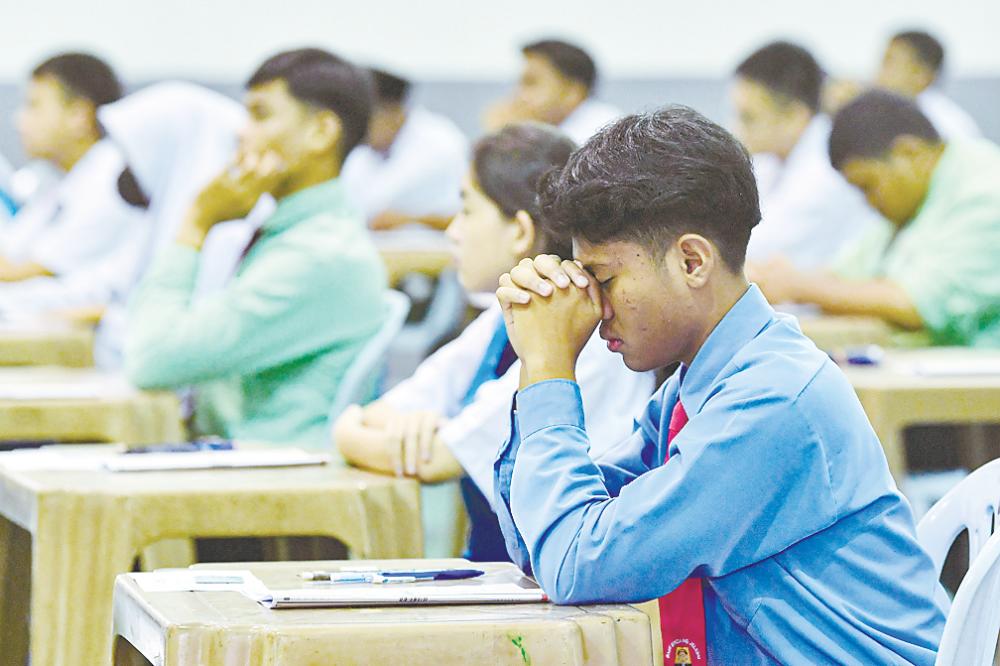ABSENTEEISM among students sitting for the Sijil Pelajaran Malaysia (SPM) examination is a growing concern in schools nationwide, with a record of 2.7% to 3% absentees for 2023 and 2024.
These numbers are alarming as there have been no actions taken so far to reduce the percentage of absentees among SPM candidates.
SPM is a pivotal milestone in students’ academic journeys; it serves as a gateway to higher education and future career opportunities. Despite its importance, schools continue to report significant absentee rates during the examination period.
The removal of the Ujian Penilaian Sekolah Rendah (UPSR) and Pentaksiran Tingkatan Tiga (PT3), for example, has significantly altered the academic trajectory for students. Without these foundational exams, some students may struggle to adapt to the rigour of SPM, leading to disengagement and absenteeism.
The lack of intermediate benchmarks, such as UPSR and PT3, may also contribute to a decline in motivation and preparedness.
Other factors such as financial difficulties may force some of the SPM candidates to prioritise work or family responsibilities over education.
In some cases, parents may be unable to afford transportation or exam-related expenses, discouraging students from attending school, indirectly making them opt out from the SPM exam.
The pressure to excel in SPM can also heighten anxiety and stress levels. Without proper support systems, students may choose to avoid school altogether, viewing absenteeism as an escape from overwhelming expectations.
Furthermore, a lack of interest in studies, often stemming from ineffective teaching methods or non-inclusive curricula, can cause students to disengage and skip school.
Peer pressure also plays a significant role in absenteeism. Students who are part of groups that devalue education
or prioritise social activities over academic commitment may adopt similar behaviours.
Family issues such as divorce, illness or caregiving responsibilities can also contribute to absenteeism as students may feel obligated to stay home, leading them to lose focus on their education.
The emergence of the gig economy also contributes to absenteeism among SPM candidates as the idea of needing an academic certificate to pursue a career in areas like e-hailing, food delivery and content creation is no longer seen as essential.
Absenteeism has far-reaching consequences, not only for students but also for schools and society as a whole. Students who miss classes are likely to fall behind academically, leading to lower grades and decreased opportunities for future careers.
Schools may also face challenges in meeting performance benchmarks, which can impact funding and resources.
To address absenteeism effectively, a multipronged approach is necessary. In light of the abolishment of UPSR and PT3, schools should provide additional support to students. This could include offering bridging programmes to help students transition effectively and supplementary lessons to reinforce foundational knowledge.
Schools and government bodies could provide subsidies for transportation, meals and exam fees to ease the financial burden of needy students and their families.
Introducing counselling services and stress management workshops can help students cope with exam-related anxiety.
Creating a supportive environment encourages open communication about mental health. Adopting interactive and practical teaching strategies can make learning more enjoyable and relevant, helping students stay motivated.
Schools could host workshops to educate parents on the importance of consistent attendance, and provide strategies to support their children’s education.
Implementing attendance tracking systems can help schools identify at-risk students early. Engaging with these students through mentorship programmes and home visits can prevent chronic absenteeism.
Another major improvement that relevant agencies could undertake is the reintroduction of an improved version of UPSR and PT3.
Reintroducing the UPSR and PT3 is pivotal in strengthening Malaysia’s education system, especially as a foundational exam for SPM.
UPSR and PT3 exams are essential to restore structure and accountability in Malaysia’s education system as these exams serve as crucial milestones to gauge students’ progress and identify learning gaps early. They motivate consistent effort, provide a clear academic pathway and ensure fair and standardised evaluations across schools.
Furthermore, these assessments promote discipline, time management and preparedness, reducing disengagement and absenteeism while enabling educators and policymakers to monitor educational standards effectively.
By reinstating these examinations, students will be better equipped for SPM and future academic or career challenges.
Strong action needs to be taken to ensure that the absenteeism rate is reduced in the near future. As educators, parents and policymakers, it is our collective responsibility to ensure every SPM candidate has the opportunity to succeed.
By addressing the root causes of this absenteeism and creating a supportive ecosystem for learning, this issue can be mitigated.
The future of our youngsters is in our hands. The government, through the Education Ministry and other relevant agencies, should prioritise addressing this issue to ensure a steady reduction in absenteeism rates over time.
Dr Muhammad Ammirrul Atiqi Mohd Zainuri is a senior lecturer at the Department of Electrical,
Electronic and Systems Engineering,
Universiti Kebangsaan Malaysia.
Comments: letters@thesundaily.com









